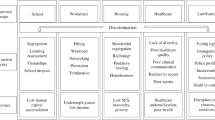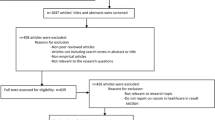Abstract
The Affordable Care Act, which expanded health insurance coverage to millions of Americans and federally mandated the provision of health insurance to individuals with “pre-existing conditions,” is a politically divisive law facing an ongoing ‘repeal and replace’ effort in Congress. As patients, caregivers, and health activists fight to resist the repeal of the ACA, they are sharing intimate illness narratives in an effort to frame the repeal effort as a looting of their insurance benefits and an attack on the investment in equity and justice they say the ACA represents. Drawing on a discourse analysis of primary documents from the U.S. Department of Health and Human Services and illness narratives shared by the Service Employees International Union’s Fight For Our Health activist campaign, this article examines how the illness narrative is deployed here as a political call to action. I consider how this resistance effort frames the inevitability of illness and the emotional burdens of what I call ‘health insurance precarity,’ or the uncertainty that defines the experience of being uninsured, as a justification for positioning health activism as a cultural and political obligation shared by all.
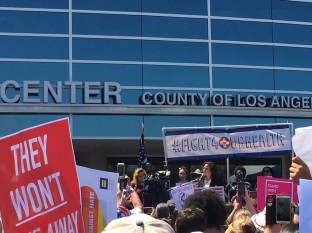
(Photo Credit: Author)
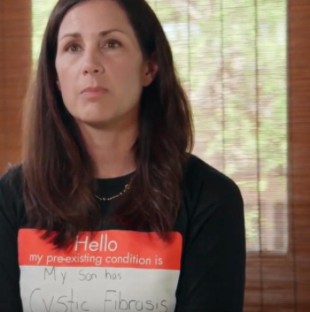

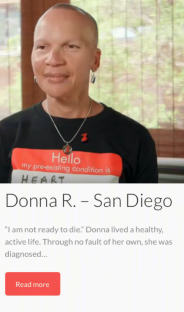
Similar content being viewed by others
Notes
Operating as an organizational hub for progressive movements, SEIU, for example, launched Fight for $15, the national campaign to double the federal minimum wage and unionize restaurant employees. Former SEIU President Andrew Stern, who led the union from 1996 to 2000, was known to be a close ally of Obama. A corporatist union boss who courted businesses as key partners in health reform, Stern supported market-based approaches to reform and, controversially, was “openly dismissive” of the single-payer approach (Gottschalk 2007, p. 940).
Haunting this demonstration is the history of Martin Luther King, Jr./Charles Drew Medical center, a county general hospital in Los Angeles built in 1972 to deliver care to the underserved residents of the Watts and Willowbrook neighborhoods of the city. The hospital was plagued by “poor medical care for the poor” (Hunt and Ramon 2010, p. 283) and inadequate funding from the county. The hospital closed in 2006, and was the subject of an intense community and citywide battle to determine the fate of the facility and the access to care local residents desperately needed. The fundamental issue of access to care in the closure of King/Drew makes the choice of location for this demonstration at the Harbor-UCLA Medical Center, another county general hospital in Los Angeles, especially poignant. More can be read on this battle in Darnell Hunt and Ana-Christina Ramon’s “Killing ‘Killer King’: The Los Angeles Times and a ‘Troubled’ Hospital in the ‘Hood,” Black Los Angeles: American Dreams and Racial Realities (Darnell Hunt and Ana-Christina Ramon, Eds.).
According to the Kaiser Family Foundation (2017), the number of uninsured nonelderly Americans decreased from 44 million in 2013—the year just prior to when the major provisions of the ACA took effect—to fewer than 28 million at the end of 2016 (1).
The notion of the “pre-existing condition,” a bureaucratic designation that defines patienthood in terms set forth by the for-profit health insurance industry, is troubling in its ubiquity. Unfortunately, its use in common parlance is necessary as a shorthand for the millions of Americans saddled with this designation who must find the means to secure health benefits and the language to categorize themselves and others like them.
According to the instructions provided in the Story Gathering Toolkit, these surveys are to be printed double-sided, and stickers are to be printed on standard Avery 5160 labels. This standardization is illustrative of the affordances provided in the kit to enable a health activism that is, and can be read as, accessible to all, regardless of prior activist or organizing experience.
Personal communication, September 7, 2017.
Vonnegut can be seen illustrating this theory, the subject of a failed graduate thesis, here: https://www.youtube.com/watch?v=oP3c1h8v2ZQ. His theory is also the subject of popular press accounts as well as an effort by researchers from the University of Vermont and the University of Adelaide to collect and classify computer-generated story arcs for close to 2000 pieces of fiction. The project works to track the emotional trajectory of these stories, using Mechanical Turk to code the emotional tone of common words as part of the classification. That work can be found here: https://arxiv.org/abs/1606.07772.
The anxiety around how we colloquially understand, codify, and legislate the role of the individual in maintaining their health has deep roots in cultural values around sovereignty, health policy documents like the Canadian Health Ministry’s 1974 Lalonde Report and the U.S. Surgeon General’s Healthy People report of 1979, and the contemporary effort to mandate that individuals eligible for Medicaid benefits sign personal responsibility contracts and satisfy employment requirements to receive their benefits.
References
Abramowitz, J. 2018. The effect of ACA state medicaid expansions on medical out-of-pocket expenditures. Medical Care Research and Review. https://doi.org/10.1177/1077558718768895.
Bagley, Nicholas. 2018. Trump’s legal attack on the ACA isn’t about health care. It’s a war on the rule of law. Vox. Retrieved from https://www.vox.com/the-big-idea/2018/6/8/17442238/trump-aca-obamacare-texas-department-of-justice-rule-of-law.
Berlant, L. 2011. Cruel Optimism. Durham: Duke University Press.
Berliner, L., and N. Kenworthy. 2017. Producing a worthy illness: Personal crowdfunding amidst financial crisis. Social Science and Medicine 187: 233–242.
Brodie, M., D. Altman, C. Deane, S. Buscho, and E. Hamel. 2010. Liking the pieces, not the package: Contradictions in public opinion during health reform. Health Affairs 29 (6): 1125–1130.
Brown, N. 2003. Hope against hype: Accountability in biopasts, presents and futures. Science Studies 16 (2): 3–21.
Brown, P., et al. 2004. Emboddied health movements: New approaches to social movements in health. Sociology of Health and Illness 26 (1): 50–80.
Butler, J. 2004. Precarious life: The powers of mourning and violence. London: Verso.
Cartwright, L. 1998. Community and the public body in breast cancer media activism. Cultural Studies 12 (2): 117–138.
Charon, Rita. 2001. Narrative medicine: A model for empathy, reflection, profession, and trust. New England Journal of Medicine 286 (15): 1897–1902.
Claxton, G. et al. 2016. Pre-existing conditions and medical underwriting in the individual insurance market prior to the ACA. The Kaiser Family Foundation, 1–11.
Dumit, J. 2006. Illnesses you have to fight to get: Facts as forces in uncertain, emergent illnesses. Social Science and Medicine 62 (3): 577–590.
Dumit, J. 2012. Drugs for life: How pharmaceutical companies define our health. Durham: Duke University Press.
Epstein, S. 1996. Impure science: AIDS, activism, and the politics of knowledge. Berkeley: University of California Press.
Farman, A. 2017. Terminality. Social Text 35 (2(131)): 93–118.
Fisher, W.R. 1989. Clarifying the narrative paradigm. Communication Monographs 56: 55–58.
Fletcher, R.A. 2014. Keeping up with the cadillacs: What health insurance disparities, moral hazard, and the cadillac tax mean to the patient protection and affordable care act. Medical Anthropology Quarterly 30 (1): 18–36.
Gottschalk, M. 2007. Back to the future? Health benefits, organized labor, and universal health care. Journal of Health Politics, Policy and Law 32 (6): 923–970.
Himmelstein, D., et al. 2009. Medical bankruptcy in the United States, 2007: Results of a national study. The American Journal of Medicine 122: 741–746.
Horton, S., C. Abadía, J. Mulligan, and J.J. Thompson. 2014. Critical anthropology of global health “takes a stand” statement: A critical medical anthropological approach to the US’s affordable care act. Medical Anthropology Quarterly 28 (1): 1–22.
Hunt, D. and Ramon, A. 2010. Killing ‘Killer King’ The Los Angeles times and a ‘troubled’ hospital in the ‘hood. In Black Los Angeles: American dreams and racial realities, 283-320. New York: NYU Press.
Jacobs, L.R., and S. Mettler. 2011. Why public opinion changes: The implications for health and health policy. Journal of Health Politics, Policy and Law 36 (6): 917–933.
Kaiser Family Foundation. 2017. Key facts about the uninsured population. https://www.kff.org/uninsured/fact-sheet/key-facts-about-the-uninsured-population/.
Keefe, R., et al. 2006. From the bottom up: Tracing the impact of four health-based social movements on health and social policies. Journal of Health and Social Policy 21 (3): 55–69.
Kleinman, A. 1988. The illness narratives: Suffering, healing and the human condition. New York: Basic Books.
Kneese, T. 2018. Mourning the commons: Circulating affect in crowdfunded funeral campaigns. Social Media Society 4 (1): 1–12.
Martinez-Hume, A., A.M. Baker, H.S. Bell, I. Montemayor, K. Elwell, and L.M. Hunt. 2017. “They treat you a different way:” Public insurance, stigma, and the challenge to quality health care. Culture, Medicine and Psychiatry 41: 161–180.
Miller-Day, M., and M. Hecht. 2013. Narrative means to preventative ends: A narrative engagement framework for designing prevention interventions. Health Communication 28 (7): 657–670.
McCosker, A., and R. Darcy. 2013. Living with cancer: Affective labour, self-expression and the utility of blogs. Information, Communication and Society 16 (8): 1266–1285.
Mulligan, J.M., and H. Castañeda. 2018. Unequal coverage: The experience of health care reform in the United States. New York: New York University Press.
Oberlander, J. 2010. Long time coming: Why health reform finally passed. Health Affairs 29 (6): 1112–1116.
Oberlander, J. 2014. Between liberal aspirations and market forces: Obamacare’s precarious balancing act. Journal of Law, Medicine and Ethics 42 (4): 431–441.
Oberlander, J. 2016. Implementing the affordable care act: The promise and limits of health care reform. Journal of Health Politics, Policy and Law 41 (4): 803–826.
Office of the Assistant Secretary for Planning and Evaluation. 2011. At-risk: Pre-existing conditions could affect 1 in 2 Americans, 1–10. Washington: U.S. Department of Health and Human Services.
Office of the Assistant Secretary for Planning and Evaluation. 2017. Health insurance coverage for americans with pre-existing conditions The impact of the affordable care act, 1–16. Washington: U.S. Department of Health and Human Services.
Papacharissi, Z. 2018. A networked self and platforms, stories, connections. New York and London: Routledge.
Parthasarathy, S. 2010. Breaking the expertise barrier: Understanding activist strategies in science and technology policy domains. Science and Public Policy 37 (5): 355–367.
Quadagno, J. 2014. Right-wing conspiracy? Socialist plot? The origins of the patient protection and affordable care act. Journal of Health Politics, Policy and Law 39 (1): 35–56.
Rose, N., and C. Novas. 2005. Biological citizenship. In Global assemblages: Technology, politics, and ethics as anthropological problems, ed. A. Ong and S.J. Collier, 439–463. Malden: Blackwell Publishing.
Serlin, D. 2010. Imagining illness: Public health and visual culture. Minneapolis: University of Minnesota Press.
Starr, P. 2011. Remedy and reaction: The peculiar American struggle over health care reform. New Haven: Yale University Press.
Squires, D., and C. Anderson. 2015. U.S. health care from a global perspective: Spending, use of services, prices, and health in 13 countries. The Commonwealth Fund 15: 1–16.
Tamariz, L. 2017. Personal communication.
Zoller, H. 2005. Health activism: Communication theory and action for social change. Communication Theory 15 (4): 341–364.
Acknowledgements
Thanks to Laurel Tamariz for providing insight into the story coordination process she manages for the FFOH campaign. This manuscript is comprised of original research material, and it is not under review elsewhere. I do not have any competing interests in this research.
Author information
Authors and Affiliations
Corresponding author
Additional information
Publisher's Note Springer Nature remains neutral with regard to jurisdictional claims in published maps and institutional affiliations.
Rights and permissions
About this article
Cite this article
Merid, B. Fight for our health: Activism in the face of health insurance precarity. BioSocieties 15, 159–181 (2020). https://doi.org/10.1057/s41292-019-00145-9
Published:
Issue Date:
DOI: https://doi.org/10.1057/s41292-019-00145-9



